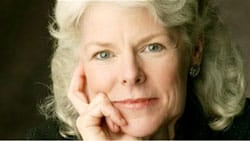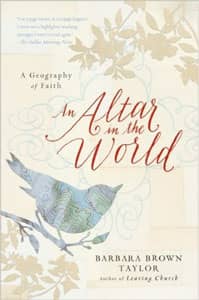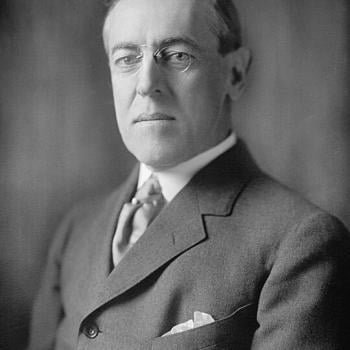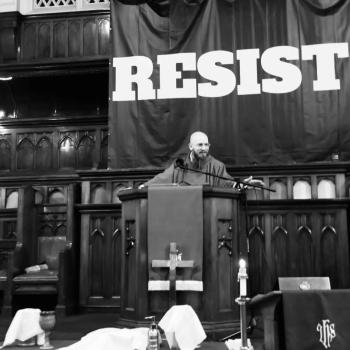By David Crumm
 As the title of her book, An Altar in the World: A Geography of Faith, suggests, Barbara Brown Taylor is a guide to rediscovering wellsprings of spiritual meaning outside the bricks and mortar of religious institutions. That may sound like an odd vocation for a woman who has been both a parish priest and a religious educator.
As the title of her book, An Altar in the World: A Geography of Faith, suggests, Barbara Brown Taylor is a guide to rediscovering wellsprings of spiritual meaning outside the bricks and mortar of religious institutions. That may sound like an odd vocation for a woman who has been both a parish priest and a religious educator.
What strikes readers first is her daring honesty that welcomes us into her life--like an old friend sharing a cup of hot tea across a kitchen table.
Even if you're not Christian, which is her religious affiliation, you still may enjoy this book. In her book, she writes that far too many people need saving "from the idea that God sees the world the same way they do." Hmmm. Now that is a different perspective. Consider these universal themes as we share highlights from our conversation with Barbara Brown Taylor:
DAVID: It's always wonderful to talk with you, Barbara. I'm saying that on behalf of all the readers who visited our magazine just to read our previous interview with you about "An Altar in the World."
BARBARA: It's good to talk with you again.
DAVID: This time, I want to organize our interview a little differently. I'm going to point out key passages in your book--and I'd like you to update us about how you're approaching these themes in 2010. Sound like a plan?
 BARBARA: I just recorded the audio version of the book, so I spent a lot of hours with it and I know every good part--and every flaw.
BARBARA: I just recorded the audio version of the book, so I spent a lot of hours with it and I know every good part--and every flaw.
DAVID: I didn't find flaws. In fact, I found way too many terrific passages. I had to limit my questions to just a few.
Here's the first passage: You recommend that people focus on spiritual practices to guide them. You write, "Wisdom is not gained by knowing what is right. Wisdom is gained by practicing what is right and noticing what happens when that practice succeeds and when it fails."
So, in 2010, what practices are especially important to you?
BARBARA: When I talk about practices, I'm talking about giving myself lots of opportunity to fail because, in many ways, those are the most helpful experiences--and the ones I fear the most. In this arena of practice, I have to give up concerns for success and failure.
What mean the most to me right now? I stand in a tradition of faith that commends certain practices that have worked over a great deal of time for many people in many places, so those are great starting points.
The one I fail at most often but seems continually most important is the practice of Sabbath, or I might describe it as the practice of "saying no" or "resistance to the materialism, consumerism and busy-ness of my culture," which includes the busy-ness and consumerism of my own soul--the way I tend to bite on all of those things that come my way.
Sabbath becomes not a monthly or yearly opportunity but a weekly opportunity to pay attention to that. So, Sabbath is regular for me. I think I agree with the rabbis who said that if you engage the practice of Sabbath you really cover every thing else.
And then there's encountering the other. When I don't know where to start, I always revisit the Book. The Book says love the neighbor--but it also says love the stranger.
The stranger presents me a way to engage with the face of God even when I don't feel particularly ready for that.
Prayer also is important, although I often fall short on that as many of us do. I've had to redefine prayer not as something I do with my hands folded on my knees, but as something I do when I place myself consciously in the presence of the other.
DAVID: That's a fascinating start to a list. I want to follow up on "the stranger." I'm running into a lot of important new voices talking about the absolutely essential need to hospitably welcome and engage the strangers in our midst. That's one of the major themes of the writer Samir Selmanovic, who we also listed this year along with you in our "10 Spiritual Sages to Watch in ‘10" list. You write about this in your own book. I like this line: "The moment I turn that person into a character in my own story, the encounter is over."
BARBARA: We like to paste labels on strangers all too quickly. We do this every day, because we're so fond of starring in our own dramas. If I drive into a parking lot and I start cutting across the yellow-marked spaces, which I'm not supposed to be doing, and then someone almost hits my car, I think: "She almost hit me!" I'm angry at her. I'm pasting labels on her.




